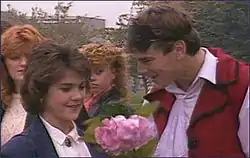Damon Grant
Damon Grant is a fictional character in the defunct British soap opera Brookside, played by Simon O'Brien. The character was part of the initial cast, appearing from episode one in 1982 until 1987. At the time of the soap's inception, Damon was the youngest son of Bobby and Sheila Grant, with an older brother, Barry, and older sister, Karen.[1]
| Damon Grant | |||||||||||||||||
|---|---|---|---|---|---|---|---|---|---|---|---|---|---|---|---|---|---|
 | |||||||||||||||||
| Brookside character | |||||||||||||||||
| Portrayed by | Simon O'Brien | ||||||||||||||||
| Duration | 1982–1987 | ||||||||||||||||
| First appearance | 2 November 1982 | ||||||||||||||||
| Last appearance | 23 November 1987 | ||||||||||||||||
| Created by | Phil Redmond | ||||||||||||||||
| Spin-off appearances | Damon and Debbie (1987) | ||||||||||||||||
| Classification | Former; regular | ||||||||||||||||
| |||||||||||||||||
Introduction
Damon was introduced after having broken into the Collins' house in the first episode on 2 November 1982, aged 14. When questioned by Paul Collins about the theft of a lavatory and vandalism that had occurred, Bobby lashes out at Damon. Barry defends Damon after the occurrence, pointing out that he did not have the tools to remove the lavatory in the way it had been done and that the graffiti could not have been Damon either as "he only spells 'bollocks' with one 'l'".
Social commentary
The Brookside soap opera was regarded as tackling social issues,[2] and this was no less true when dealing with the Grant family, and Damon.[3][4] One of the first of the show's many teenage characters to capture the viewing public's imagination,[5][6] the role saw O'Brien catapulted to fame as a teen heart throb,[7][8][9] and his adoption of the "mullet" hairstyle proved to be in keeping with the fashion of the times, and saw the character further entrenched as a cultural reference point.[3][10][11]
Storylines saw Grant presented initially as a cheeky, lovable character, with a close group of friends. The manner of Grant's characterisation, both by the writers, directors and by O'Brien,[12] led Jane Root, writing in Open the Box: About Television, to cite the character as evidence of "complex male characters and masculine storylines". Root saw this focus as different from established soap operas.[13]
As the character grew older and left school, the writers used storylines to comment on life in Thatcher's Britain. Unemployment was a serious social issue, especially in a dock city such as Liverpool, and O'Brien's character struggled to find work.[14][15] Eventually he took a position as a painter and decorator through the recently introduced YTS scheme, the writers depicting the excitement and later despair when Grant's participation failed to lead to a full-time job to great effect.[16][17][18]
Damon and Debbie

The character was then shown to develop a relationship with Debbie McGrath, played by Gillian Kearney. McGrath was an underage school girl, and the relationship caught the heart of viewers.[19] When O'Brien decided to leave the show, the producers of Brookside decided to spin this plotline into a separate show, Damon and Debbie, broadcast in a later timeslot than that in which Brookside was shown.[20]
This three part series, credited as the first 'soap bubble'.[21][22] moves the character out from Liverpool in search of work. In the first episode the couple squat on a boat on the River Ouse in York, in the second episode they move to Morecambe and then Bradford, where Damon gets a job as a groundsman at Valley Parade (the stadium of Bradford City football club) before they finally return to York in the third episode. Ultimately, the character is stabbed by Crosby actor Jonathan Comer, and dies at the end of the series at O'Brien's request,[23] a move which sparked upset and outrage amongst fans of the show, and added to both Brookside's fame and notoriety.[17][24][25][26][27][28][29][30]
Legacy
Within the Brookside show the character's death was used as a catalyst for again exploring a number of issues, including the grief of the character's mother, played by Sue Johnston, and that of the character's father, Bobby Grant, played by Ricky Tomlinson, who was shown as blaming the death upon his unemployment.[14] Ultimately, Damon's death led to the splintering of the Grant family within Brookside.[31][32]
The character's funeral was watched by 7 million viewers, against Channel 4's record rating of 8.4 million set in 2005,[33] and in The Daily Mirror, critic Clare Raymond claimed it to be one of the "most touching soap scenes".[34] In 2001, Jim Shelley, writing for The Observer, claimed the character's death to be one of two contenders for the moment where it all went wrong for Brookside,[35] while in 2002, with the announcement that Brookside was to end, the funeral scene was listed as the fourth greatest episode in the soap's history by The Daily Mirror.[36] In 2003, producer Phil Redmond discussed plans to continue the show through a series of DVD's, with one planned storyline involving '"Brookside's greatest untold story" -what would happen if Barry caught up with Damon's killers.'[37]
References
- "Telly Tardis ; We tune in to what was happening in TV-land this week in years gone by". The Daily Mirror (London); 2 Nov 2002; p. 11
- Henderson, Leslie (2007). Social Issues in Television Fiction. Edinburgh University. pp. 32–5. ISBN 0-7486-2532-1.
- "What will local talent do now?" Daily Post (Liverpool); 5 Nov 2003; Tony Barrett; p. 14
- "Trainers, terraces and trend setters ; IT was the youth cult which linked fashion and football - author Phil Thornton tells PADDY SHENNAN about 'the casuals'". Liverpool Echo (Liverpool); 31 May 2003; PADDY SHENNAN; p. 6
- "TV HIGHLIGHTS". Evening Telegraph (Coventry); 4 Oct 2000; MARION McMULLEN; p. 20.85
- "SOAP". Mail (Birmingham); 4 Oct 2000; Graham Young; p. 23
- "No escape from the houses from hell" Liverpool Echo (Liverpool); 5 Aug 2003; p. 19
- "Doctor's dilemma". The Daily Mirror (London); 24 Aug 1996; p. 5
- "Former TV actor aims to saddle up for store move". Daily Post (Liverpool); 11 Oct 2001; p. 13
- "WHAT BRITAIN'S TOP TV CRITIC WATCHED LAST NIGHT". The Express 13 August 2003; TV EXPRESS EDITED BY CHARLOTTE CIVIL CHARLIE CATCHPOLE
- "'This is a bunch of lies! Sneaky! Underhand!'". The Independent (London); 26 Dec 2007; p. 8
- "TV insider: Whatever happened to..? - Simon O'Brien ; Behind the scenes with Nicola Methven". The Daily Mirror (London); 2 Aug 2003; Nicola Methven; p. 15
- Root, Jane (1986). Open the Box: About Television. Routledge. p. 72. ISBN 0-906890-78-0.
- Robert Clyde Allen, (1995).To be continued--: soap operas around the world, Routledge, p.72. ISBN 0-415-11006-8
- "Sunset over Brookside - The decline in its credibility". The Times (London); 5 Aug 2003; David Housham; p. 29
- Brandt, George W. (1993). British Television Drama in the 1980s. Cambridge University Press. p. 44. ISBN 0-521-42723-1.
- "Screen: Television: Close encounters: Brookside is about to turn 18, making it as old as Channel 4 itself. Tina Ogle celebrates its highs, notes a few lows, and predicts a return to the form of its golden age". The Observer (London); 29 Oct 2000; Tina Ogle; p. 8
- "Flashback: New chapter for the small screen ; Peter Grant talks to Merseyside's master of television". Liverpool Echo (Liverpool); 25 Jun 2005; Peter Grant; p. 33
- "A shameless life of close encounters Ahead of her new play, Gillian Kearney tells Neil Cooper about growing up on television". The Herald (Glasgow); 20 Feb 2007; Neil Cooper; p. 16
- Dorothy Hobson, (2007). Channel 4: The Early Years and the Jeremy Isaacs Legacy, I.B.Tauris, p.42. ISBN 1-84511-613-5
- Plunkett, Jon (10 October 2002). "Brookside: the highs and lows". Media Guardian. Retrieved 26 March 2008.
- "CHANNEL 4 AT 25". Off the Telly. November 2002. Archived from the original on 17 January 2008. Retrieved 26 March 2008.
- "Where are they now? ; Simon O'Brien". Daily Record (Glasgow); 26 Oct 2002; p. 33
- "Rock 'n' roll sci-fi Arts: Killer B-musical Return To The Forbidden Planet is returning to the stage. Maureen Paton meets its creator". Evening Standard (London); 13 Aug 2001; MAUREEN PATON; p. 49
- "Why my Hollywood dream turned sour ; When Simon O'Brien quit Brookside he went to Los Angeles to find his fortune but couldn't stand the Californian culture. Now he's back home, starring in another Liverpool drama." The Daily Mirror (London); 11 Sep 1999; Pauline Wallin; p. 17
- "BROOKSIDE'S MOMENTS OF GLORY". Daily Record (Glasgow); 24 Feb 2000; VICKY SPAVIN; p. 20.21
- "It's murder being in a soap". Northern Echo (Darlington); 3 Nov 2000; Steve Pratt; p. 15
- "Characters are dying to attract your attention". The Times (London); 19 Dec 1997; Carol Midgley; p. 5
- "CLOSE E ENCOUNTERS ; As Brookside prepares for its final episode after 21 years, TV Editor Frances Traynor takes a look at the soap's most controversial plotlines". Daily Record (Glasgow); 31 Oct 2003; Frances Traynor; p. 38.39
- Hart, Andrew, (1991). Understanding the Media: A Practical Guide, Routledge, p.163. ISBN 0-415-05713-2
- "Matt LeBlanc on life after Friends : SPIN-OFF CITY" Sunday Mail (Glasgow); 30 Jan 2005; p. 11
- "Whatever happened to the first residents of . . . Brookside Close ; As Brookside celebrates its 20th birthday today, Dawn Collinson looks back at the original cast of the soap and how they have fared since leaving the Close". Liverpool Echo (Liverpool); 2 Nov 2002; Dawn Collinson; p. 14
- "Owen Gibson. Record viewing figures for Channel 4 as 8.4 million watch climax to fourth Test", 30 August 2005, The Guardian.
- "VIOLENCE IN SOAPS.. TUNE IN OR TURN OFF?" The Daily Mirror (London); 28 Jul 1997; CLARE RAYMOND; p. 6
- "The Guide: Soft soap: It's Soaphead's favourite time of year. No, not the soap awards, much better than that - it's the culling season, and they're dropping like flies this month". The Observer (London); 30 Jun 2001; Jim Shelley; p. 12
- "Brookside closed: 10 GREAT BROOKSIDES". The Daily Mirror (London); 11 Oct 2002; p. 8
- "Show you couldn't ignore ... ; AS Brookside comes to an end after 21 years, its creator Phil Redmond tells Paddy Shennan what its epitaph should be". Liverpool Echo (Liverpool); 29 Oct 2003; Paddy Shennan; p. 6